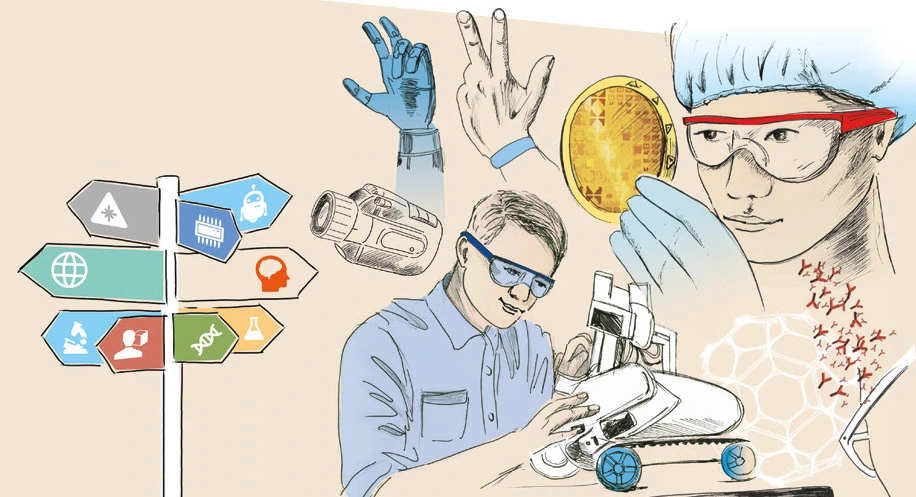No Need to Travel Far for Cool Jobs
How Adlershof supports career transitions between science, business and management
Due to its hundreds of high-tech companies, leading research institutes and start-up hubs, Adlershof is a land of opportunity for students and graduates of Berlin’s Humboldt-Universität. Most often, they are not aware of the many career opportunities waiting for them on their university’s doorstep. This is about to change.
Peter Frensch is convinced that Adlershof has much more to offer to university graduates and aspiring researchers than most people are aware of. He wants to improve visibility of these opportunities
For this reason, the professor for psychology and vice research president of the Humboldt-Universität zu Berlin (HU) developed a letter of intent together with the Joint Initiative of Non-University Affiliated Research Institutes in Adlershof e.V. (IGAFA), the TKA Adlershof e.V. and WISTA-MANAGEMENT GMBHG (WISTA), which outlines measures to systematically support career transitions between science, business and management.
Adlershof is in a favourable position to become a “place of opportunity for aspiring researchers.” On the one hand, it has highly-skilled students, PhD students and post-docs across a broad range of disciplines, who wish to transition into private enterprises, start-ups or the tenure track from their universities and research facilities. On the other hand: around 1,000 predominantly high-tech companies, who operate in future technologies, including optics, renewable energy, IT or biotechnology. Many of them cater for highly specialised niches on a global level. Many companies come to Adlershof in the first place because the recruiting situation is so good.
However, they sometimes have difficulties finding a direct link to students and graduates. Students and graduates, on the other hand, are often not aware of the many interesting potential employers Adlershof provides. Therefore, says Frensch, it is essential for the future to systematically improve the connection between those two worlds all the way up the career ladder.
This should start at university. Cooperation programmes between the HU and Adlershof-based companies with a focus on application could give students the opportunity to gain relevant experiences and to apply the knowledge they acquired in lectures in a real-word context. This would also give companies ways to meet potential professionals. The “Humboldt Wagniswerkstätten” took place for the first time this year. It is a forum for researchers, students, start-ups and established companies to develop innovative ideas. February saw the successful inception of the so-called Transfer Lab with the Adlershof-based company 5micron GmbH, a SYSTMHAUS that develops specialised surface metrology technology.
In addition, Frensch wants to initiate joint PhD projects between universities and companies. The aim is to build bridges between the HU’s basic research and the applied focus of the companies. These cooperation efforts could also be continued on a higher academic level by creating and funding interdisciplinary student groups or junior professorships.
Aspiring researchers and companies alike would profit not only from gaining access to their respective infrastructures, for example, laboratories and manufacturing facilities, but also from their respective networks and expertise. Regarding cooperation and integration of aspiring researchers, Frensch cites the successful example of INAM, the Innovation Network for Advanced Materials, which was founded on Campus Adlershof in 2016. Scientists, companies and start-ups worked together to transfer basic research into product design. Another good example is Inuru Gmbh, a start-up that prints animated designs on paper using organic light diodes (OLEDs). After spending two years in Chemnitz, the HU start-up returned to Adlershof due to its ideal conditions for cooperation between researchers and businesses.
The HU wants to give team leaders and post-docs from non-university research facilities and companies the opportunity to gather experience in teaching. “This is interesting for a future academic career, on the one hand, but also brings a fresh perspective with an applied focus to universities,” says Frensch. Lastly, a joint mentoring programme will allow aspiring researchers to gain knowledge and insight into issues like management and business founding.
“The important thing is to get all the potential partners to talk to each other and allow them to learn from each other,” says Frensch. Including the departments of psychology and geography was a conscious decision although they are traditionally more detached from businesses. “Those disciplines also offer surprising opportunities that will benefit both sides.”
The ideas laid out in the letter of intent are designed as a basis to work out a joint programme. “The feedback I got from WISTA, IGAFA and the TKA was very positive and I am looking forward to the ideas they will bring in,” says Frensch. By the end of the year, he is planning to host meetings and information events to get an overview of concrete demands and the companies’ requirements.
By Uta Deffke for Adlershof Journal
